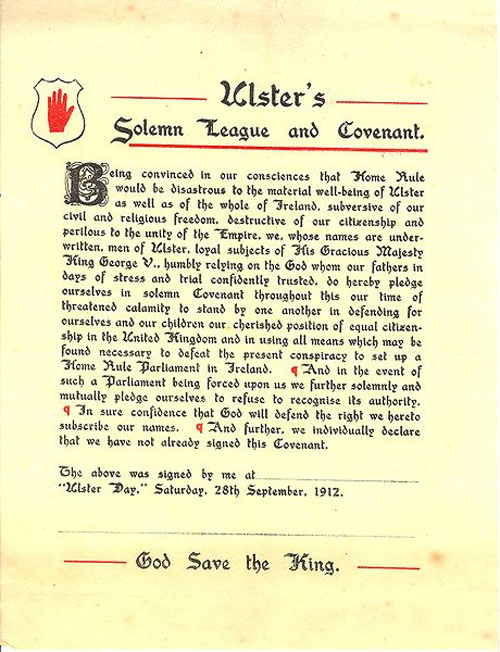Irish Unionism 1885-1922
Classic Pamphlet

Countering the Home Rule movement
It is difficult to exaggerate the importance of Irish unionism for British and Irish politics in the late nineteenth and early twentieth centuries. The movement was supported almost exclusively by Irish Protestants who were of Anglo-Irish or Scotch-Irish descent and who comprised roughly one-quarter of the population of Ireland. Its aim was to counter the Irish home rule movement and maintain the legislative union of 1800 under which Ireland was ruled directly by the Westminster parliament. In pursuit of this aim, Irish unionists organized themselves in Ireland and agitated in British politics.
Although they were not able to defeat the home rule movement and maintain the union intact, Irish unionists did significantly influence the course of British and Irish politics between 1885 and 1922. First, their opposition to home rule and their agitation in British politics delayed a settlement of the Irish question. They helped kill the first two home rule bills (1886 and 1893) and render anachronistic the third home rule bill, which reached the statute book on 18 September 1914 but which never became operative. This delay not only embittered British political life but also, by undermining the authority of the moderate Irish Parliament Party, assisted, by 1916, the ascendancy of an extreme nationalism associated with the names Sinn Fein, Irish Republican Brotherhood and Irish Republican Army. Secondly, Irish unionists influenced the eventual settlement of the Irish question.
The determination of unionists in Ulster not to submit to rule from Dublin frustrated the nationalist desire for a united Ireland, and resulted in the partition of Ireland by the Government of Ireland Act of 1920, which established the state of Northern Ireland. On the other hand, the eventual willingness of unionists in the rest of Ireland to accept home rule and to mediate between the British government and Sinn Fein paved the way for the Anglo-Irish treaty of 1921 which superseded the 1920 act in the south and set up the Irish Free State...
This resource is FREE for Student HA Members.
Non HA Members can get instant access for £3.49

